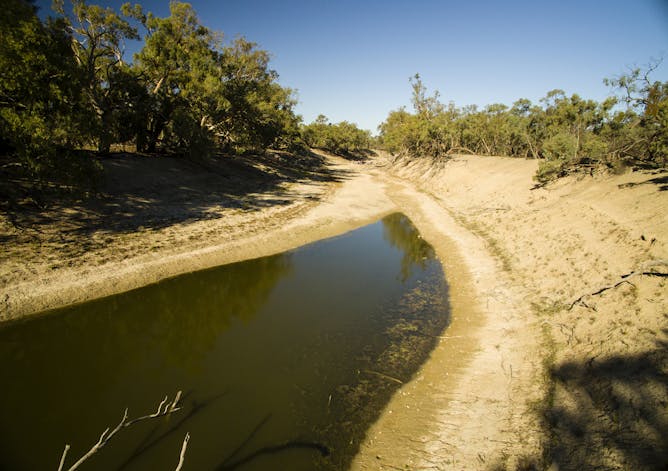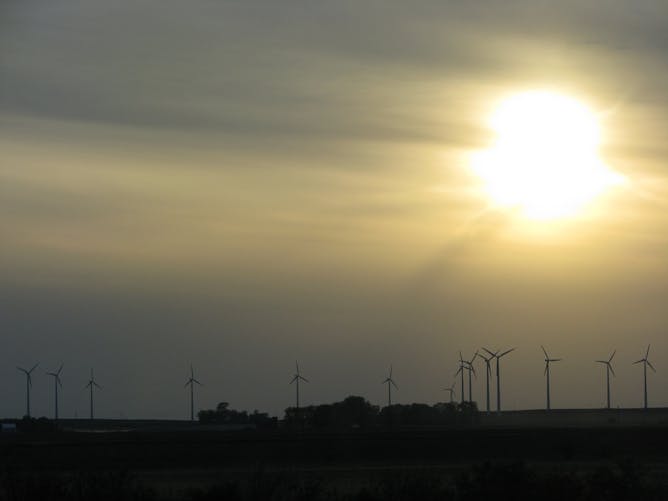|
|
|
Editor's note
|
|
As politicians react to the ongoing crisis in the Darling River, more fish deaths are expected this week. But while hundreds of thousands of fish corpses are a very visible sign of a river in distress, there’s another, quieter warning sign: bare earth. Fran Sheldon explains why the Darling River should not be running dry, even during drought and why we might be witnessing Australia’s worst environmental disaster.
How do you turn a program designed to encourage self reliance into the opposite? ParentsNext was launched with the best of intentions. Single parents “at risk” were to be given intensive support to get them back into work. Then it all went wrong, and now there’s a Senate inquiry. Beth Goldblatt explains why.
And as large parts of Australia swelter through another heat-wave, the Grattan Institute took a look at the link between hot days and blackouts. Their verdict: if someone tells you renewable energy (or any power source) causes blackouts, they’re blowing a lot of hot air. Power outages are mostly down to local failures in poles and wires, and avoiding those will cost far more than we want to pay – so the best solution is just learn to live with them.
|
Madeleine De Gabriele
Deputy Editor: Energy + Environment
|

|
|
Top story
|

Puddles in the bed of the Darling River are a sign of an ecosystem in crisis.
Jeremy Buckingham/Flickr
Fran Sheldon, Griffith University
Mass fish deaths are a blaring warning sign for the heath of the Murray Darling Basin, but just as worrying is the sight of dry areas in the Darling.
|

Under the ParentsNext that was delivered, some parents lose payments for failing to attend appointments and others don’t.
Shutterstock/Department of Jobs and Small Business
Beth Goldblatt, University of Technology Sydney
ParentsNext has punitive dimensions that threaten people's human rights. Now a Senate Committee will determine whether it's helping or harming vulnerable parents and their children.
|

Whether your energy comes from coal or renewable sources isn’t likely to make a difference to your risk of a blackout this summer.
yellowbkpk/Flickr
Guy Dundas, Grattan Institute; Lucy Percival, Grattan Institute
Summer is here and the chance of blackouts is higher than normal. But the cause is unlikely to be the power station. The problem is usually much closer to home – in the local poles and wires.
|
Education
|
-
David Roy, University of Newcastle; David Armstrong, RMIT University
It's important for the child and their achievement at school that there is a good parent-teacher-student partnership.
|
|
Health + Medicine
|
-
Samuel Banister, University of Sydney; Richard Kevin, University of Sydney
Monkey dust is in the "bath salts" family. Here's what that means.
|
|
Arts + Culture
|
-
Jane Connory, Monash University
Often overshadowed by her famous brothers, Ruby Lindsay found ways to challenge the restrictive gender roles of early-20th Century Australia.
-
Justine Shih Pearson, University of Sydney
Dancenorth's Dust explores a world on the brink of turning back to dust. Its themes are familiar in contemporary dance, but the show is replete with powerful images.
|
|
Science + Technology
|
-
Charitha Pattiaratchi, University of Western Australia; Ems Wijeratne, University of Western Australia; Roger Proctor, University of Tasmania
If you've ever wondered where the ocean currents flow around Australia's coastline then we have a great map for you.
-
Dan Jerker B. Svantesson, Bond University
Should every country have the right to impose its own laws governing the internet on the rest of the world? If so, the internet could become almost unrecognisable.
|
|
Politics + Society
|
-
Rachel Busbridge, Australian Catholic University; Mark Chou, Australian Catholic University
Scott Morrison believes local councils are "playing politics" with Australia Day. But they're simply reflecting the views of their community, and these views will only get stronger over time.
-
Anthea McCarthy-Jones, UNSW
Beginning with President Chávez and continuing under President Maduro, Venezuela has evolved into a rampant kleptocracy.
|
|
Business + Economy
|
-
Miranda Stewart, University of Melbourne
On one measure our company tax rate is the third-highest, but we like it that way because it allows us to give big tax refunds to local shareholders, many of them retirees.
|
|
Environment + Energy
|
-
Jason Alexandra, RMIT University
Public confidence in the institutions in charge of the Murray Darling Basin has plummeted – with good reason.
|
|
Cities
|
-
Igor Martek, Deakin University; M. Reza Hosseini, Deakin University
Australia's commitments to cut emissions are on a collision course with urban growth. We need a much more comprehensive strategy to make the transition to a sustainable built environment.
|
|
| |
Featured jobs
|

|
RMIT University — Bundoora, Victoria
|

|
University of Sydney — Sydney, New South Wales
|

|
University of Melbourne — Parkville, Victoria
|

|
Edith Cowan University — Mount Lawley, Western Australia
|
|
|
|
Featured events
|

|
UNSW Sydney, Kensington, New South Wales, 2052, Australia — UNSW
|

|
900 Dandenong Road, Caulfield , Melbourne, Victoria, 3145, Australia — Monash University
|

|
RMIT University, 445 Swanston Street, Melbourne, Victoria, 3000, Australia — RMIT University
|

|
Monash University Law Chambers, 555 Lonsdale Street, Melbourne, Victoria, 3000, Australia — Monash University
|
|
|
|
| |
| |
| |
| |
| |
|
|
|
|
|
|
|